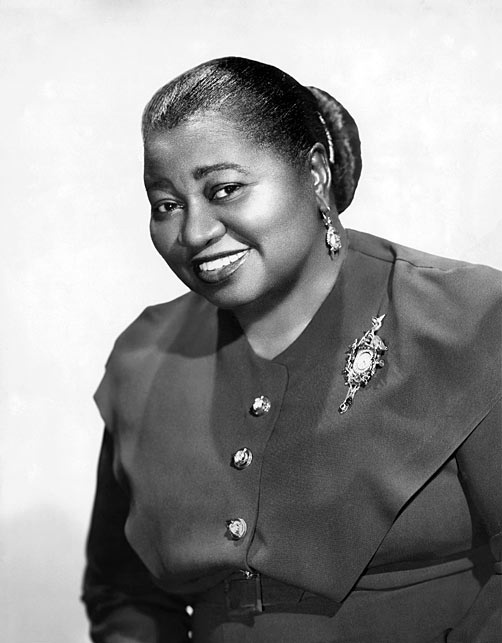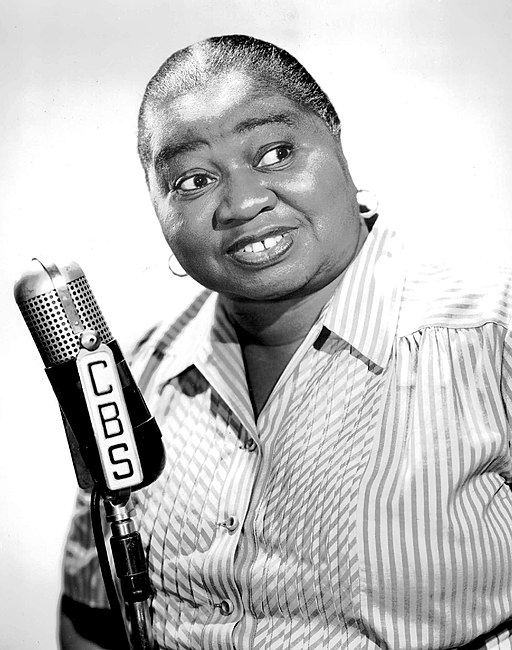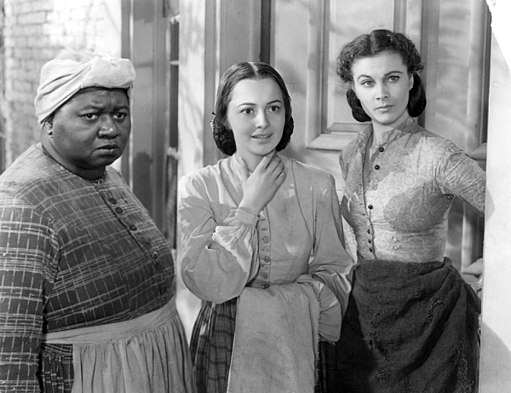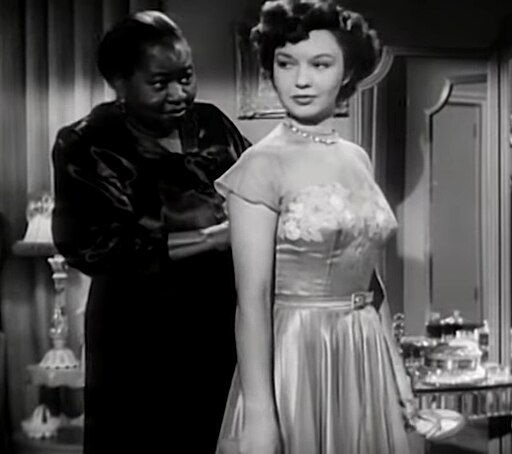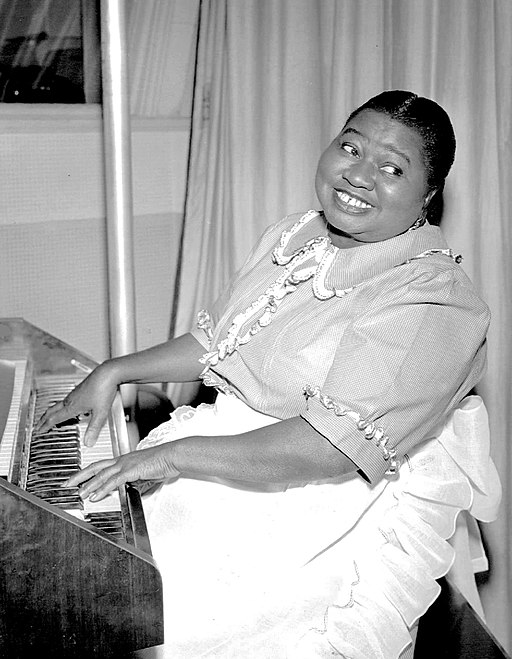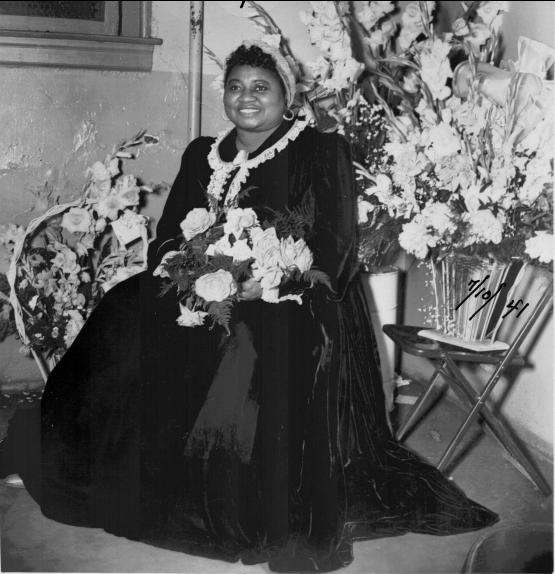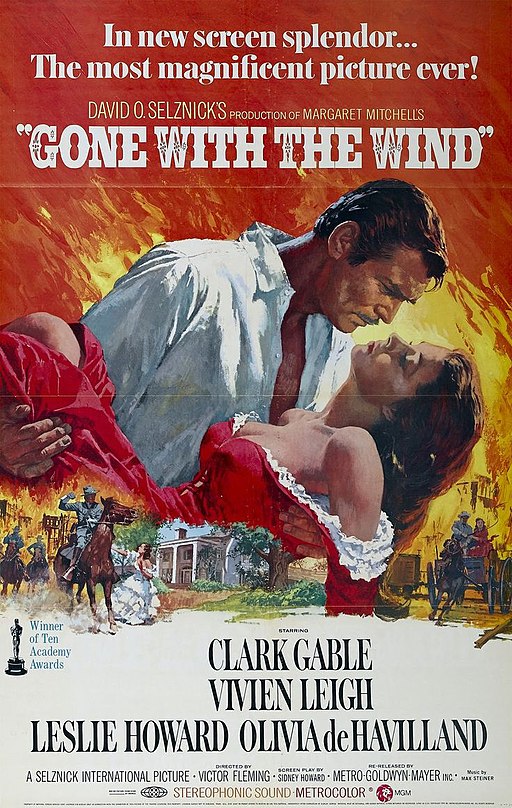Hattie McDaniel
back| Full Name | Hattie McDaniel |
| Stage Name | Hattie McDaniel |
| Born | June 10, 1893 |
| Birthplace | Wichita, Kansas, USA |
| Died | October 26, 1952 |
| Buried | Originally, McDaniel's final resting place was intended to be Hollywood Cemetery (now Hollywood Forever Cemetery), as per her will. However, due to the racial segregation policies of the time, she was not allowed to be buried there. She was instead interred at Angelus-Rosedale Cemetery in Los Angeles. In 1999, a cenotaph was erected in her honor at Hollywood Forever Cemetery. |
| Married to | George Langford (1922, his death) - Howard Hickman (divorced) - James Lloyd Crawford (1941, until her death in 1952) - Nym Lankfard (divorced) |
| Children | None |
| Notable films | Gone with the Wind (1939) - Show Boat (1936) - Alice Adams (1935) - Since You Went Away (1944) - Song of the South (1946) |
Hattie McDaniel
“Hi-Hat Hattie”, Groundbreaking Actress for African Americans
Hattie McDaniel's career spanned over 300 films, although she only received screen credits for about 80 of them. Her legacy extends beyond her film career, as she was also a professional singer-songwriter, comedian, stage actress, and radio performer.
McDaniel faced significant racial barriers and discrimination throughout her career but remained a trailblazer and a symbol of success for African American actors in a time of severe racial segregation in the United States.
Hattie McDaniel was often affectionately referred to as "Hi-Hat Hattie," a nickname that underscored her stylish and dignified demeanor, both on and off the screen. This moniker also reflected her love for wearing elegant hats, a signature part of her wardrobe that became synonymous with her public persona.
Related
Hattie McDaniel (1893 – 1952)
Detailed Biography
Hattie McDaniel was born on June 10, 1893, in Wichita, Kansas, to former slaves. She was the youngest of 13 children in her family. Her father, Henry McDaniel, fought in the Civil War, and her mother, Susan Holbert, was a domestic worker. The family moved to Denver, Colorado, where Hattie grew up.
Education and Early Talents
McDaniel demonstrated a flair for performing at a young age. She attended East High School in Denver and was active in school productions, showcasing her talents in singing and performing.
Start of Performing Career
Hattie's professional entertainment career began with her brother's minstrel show. In the 1920s, she was part of Professor George Morrison's orchestra and also performed on Denver radio stations, becoming one of the first African American women to sing on the radio.
Move to Hollywood
In 1931, amidst the Great Depression, McDaniel moved to Hollywood. She initially worked as a domestic worker and waitress, which was a common occupation for African American women at the time. However, she continued to pursue her passion for acting and singing.
Breakthrough in Hollywood
Her first film role was in "The Golden West" (1932), where she played a maid. She continued to be cast in similar roles, reflecting the limited opportunities for African American actors. Despite the typecasting, McDaniel's talent shone through, leading to more significant roles.
Oscar Win and Legacy
Hattie McDaniel's most famous role came in 1939 with "Gone with the Wind," where she played Mammy. Her portrayal won her the Academy Award for Best Supporting Actress in 1940, making her the first African American to win an Oscar. This win was a monumental moment in the history of American cinema but did not significantly change the roles available to her.
Personal Life and Marriages
McDaniel married four times. Her personal life, unfortunately, was marked by brief and sometimes troubled marriages. Her spouses included George Langford, Howard Hickman, James Lloyd Crawford, and Nym Lankfard.
Passions and Contributions
Beyond acting, McDaniel was passionate about civil rights and used her position to speak against racial discrimination. She was also a professional singer-songwriter and a radio performer, showcasing her versatile talents.
Death and Cause of Death
Hattie McDaniel passed away on October 26, 1952, due to breast cancer. She was 59 years old. Her death marked the end of an era in American cinema but left behind a legacy that would inspire future generations of African American actors and artists.
Posthumous Recognition
In her will, McDaniel expressed the desire to be buried in Hollywood Cemetery. However, due to segregation policies, her wish was not granted. She was interred at Angelus-Rosedale Cemetery. In 1999, a cenotaph was erected in Hollywood Forever Cemetery in her honor, symbolically fulfilling her wish.
Hattie McDaniel receiving her Oscar in 1940:
Hattie McDaniel’s Marriages:
Hattie McDaniel's personal life, particularly her marriages, was as complex and challenging as her professional life. She was married four times, and each marriage played a significant role in her life story:
-
George Langford (1922)
McDaniel's first marriage was to George Langford in 1922. Unfortunately, this marriage was short-lived. Langford died shortly after the marriage, reportedly of a gunshot wound, under circumstances that remain somewhat unclear.
-
Howard Hickman (date unknown)
Details about her marriage to Howard Hickman are sparse. This marriage also ended in divorce. The dates of their marriage and divorce are not well-documented, which is indicative of the private nature with which McDaniel treated her personal life.
-
James Lloyd Crawford (1941)
McDaniel married James Lloyd Crawford in 1941, after reportedly making him sign a contract that said, "No grievance whatsoever against my career." This marriage was said to be turbulent and marked by public disputes. Despite its challenges, this marriage lasted until McDaniel's death in 1952.
-
Nym Lankfard (divorced)
The details regarding her marriage to Nym Lankfard are again quite scarce. Like her other marriages, it ended in divorce. The timeline and specifics of their relationship are not well-documented in historical records.
Analysis of Hattie McDaniel’s Acting Style:
Hattie McDaniel's acting style was a remarkable blend of warmth, authenticity, and a subtle, yet powerful, presence that made her stand out even in supporting roles. Her performances were characterized by several distinctive elements:
Nuanced Emotional Range
McDaniel had a unique ability to portray a wide range of emotions. In her most famous role as Mammy in "Gone with the Wind," she displayed a multifaceted character, shifting seamlessly from moments of stern authority to scenes of gentle care and concern. This emotional versatility was a hallmark of her acting style.
Comedic Timing
Her background in vaudeville and radio greatly influenced her sense of comedic timing. McDaniel could deliver lines with a sharp wit and a sense of timing that brought both humor and depth to her characters. Her comedic skills were especially evident in her interactions with other characters, where she often provided a light-hearted counterpoint to more serious themes.
Dignified Presence
Despite the stereotypical and limited roles available to her as an African American actress during that era, McDaniel brought a sense of dignity and strength to her characters. She often played maids or servants, roles steeped in the racial prejudices of the time. Yet, she infused these characters with a sense of humanity and resilience, challenging the one-dimensional stereotypes they could have easily become.
Vocal Expression
McDaniel's background as a singer contributed to her expressive use of her voice in acting. She used her vocal range effectively to convey emotion, authority, or tenderness, depending on the demands of the role. Her voice became one of her most powerful tools in her acting repertoire.
Physicality
Her physical presence on screen was commanding yet nuanced. McDaniel understood how to use body language and facial expressions to communicate her characters' emotions and thoughts, often adding layers of meaning to her performances.
Impact on Scenes
Even in supporting roles, McDaniel had the ability to leave a lasting impact on scenes. She often stole the spotlight with her charismatic presence, turning potentially minor parts into memorable and significant contributions to the films.
Cultural Significance
Beyond her technical skills, McDaniel's performances held a deeper cultural significance. As one of the few African American actresses in mainstream Hollywood films at the time, she navigated the complex terrain of representing her race in an industry and society marked by deep-seated racial biases. Her portrayal of dignified, though often stereotyped, characters in the face of these challenges added a layer of socio-cultural commentary to her acting style.
Awards and Recognition:
Academy Awards
- 1940: McDaniel won the Academy Award for Best Supporting Actress for her role as Mammy in "Gone with the Wind" (1939). This win made her the first African American to win an Oscar.
Other Honors and Recognitions
- Posthumously, McDaniel has been recognized and honored for her contributions to cinema and her trailblazing role in breaking racial barriers.
- In 1975, she was inducted into the Black Filmmakers Hall of Fame.
- In 2006, the United States Postal Service honored McDaniel with her image on a postage stamp as part of the Black Heritage series.
- Various institutions and film organizations have retrospectively acknowledged her contributions to the film industry and her role in American cultural history.
Memorable Quotes:
On Her Roles:
- "Why should I complain about making $700 a week playing a maid? If I didn't, I'd be making $7 a week being one."
On Winning the Oscar:
- "Academy of Motion Picture Arts and Sciences, fellow members, and dear friends and children: This is one of the happiest moments of my life, and I want to thank each one of you who had a part in selecting me for one of their awards, for your kindness. It has made me feel very, very humble; and I shall always hold it as a beacon for anything that I may be able to do in the future. I sincerely hope I shall always be a credit to my race and to the motion picture industry. My heart is too full to tell you just how I feel, and may I say thank you and God bless you."
On Perseverance:
- "I did my best, and God did the rest."
On Facing Discrimination:
- "I'd rather play a maid than be one."
On Career Choices:
- "I'm letting them know that there are lots of us who are not crying and who are doing our jobs and doing them well."
Notable Movies featuring Hattie McDaniel:
1932
- "The Golden West": McDaniel had a minor role in this musical western about a miner and his daughter.
1934
- "Judge Priest": A comedy-drama set in the post-Civil War South, starring Will Rogers. McDaniel plays Aunt Dilsey, a house servant.
1935
- "The Little Colonel": This family drama stars Shirley Temple and Lionel Barrymore. McDaniel plays Walker, a maid.
- "Alice Adams": A romantic drama starring Katharine Hepburn, with McDaniel in a small role as Malena Burns, a maid.
- "China Seas": An adventure film starring Clark Gable and Jean Harlow, featuring McDaniel in a supporting role.
1936
- "Show Boat": A musical where McDaniel plays Queenie, a cook on the showboat. The film addresses racial issues and features the song "Ol' Man River."
1937
- "Stella Dallas": A drama film where McDaniel plays a maid. The film focuses on the sacrifices of a mother for her daughter.
1938
- "Everybody's Baby": A comedy where McDaniel has a supporting role.
1939
- "Gone with the Wind": McDaniel's most famous role as Mammy, a house servant. The film is a historical romance set during the American Civil War and Reconstruction era.
1940
- "The Blue Bird": A fantasy film starring Shirley Temple, with McDaniel playing Tylette, a cat who turns into a woman.
1941
- "The Great Lie": A drama where McDaniel plays a housemaid. The film is known for its portrayal of complex female characters.
1942
- "In This Our Life": A drama film directed by John Huston, featuring McDaniel in a supporting role.
1943
- "Thank Your Lucky Stars": A musical comedy where McDaniel appears as herself.
1944
- "Since You Went Away": A drama about the American home front during World War II, with McDaniel playing a domestic servant.
1946
- "Song of the South": A live-action/animated film by Disney. McDaniel plays Aunt Tempy. The film is controversial for its portrayal of African Americans.
1947
- "High, Wide, and Handsome": A musical film where McDaniel plays a minor role.
1949
- "Family Honeymoon": A comedy with McDaniel in a supporting role.

